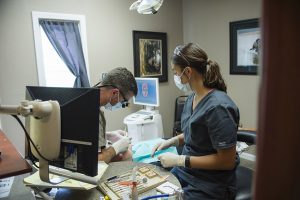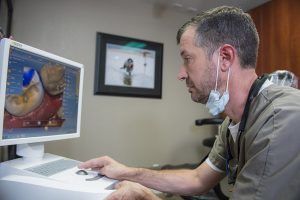Teeth Cleanings | Fillings | Crowns & Bridges | Root Canals | Tooth Extractions
Dental Exam
 Our practice can provide a wide range of dental services. We do however refer some services out to specialists such as oral surgeons, orthodontists, endodontists, and periodontists. Please check out our specialist page for more information about each particular specialst. Our emphasis is on total preventive care for our patients. Total care begins with regular hygiene visits, regular check-ups and continued home oral health routines.
Our practice can provide a wide range of dental services. We do however refer some services out to specialists such as oral surgeons, orthodontists, endodontists, and periodontists. Please check out our specialist page for more information about each particular specialst. Our emphasis is on total preventive care for our patients. Total care begins with regular hygiene visits, regular check-ups and continued home oral health routines.
Our practice also provides the highest-quality services for restoring mouths that have been damaged by dental disease and injury and common problems that require cosmetic dentistry. Our primary goal for our patients is to achieve and maintain optimum oral health through advances in techniques, technologies and by maintaining their scheduled dental exams.
Teeth Cleanings
Twice a year, you should schedule a routine dental cleaning. During this visit, one of our dental hygienists will remove plaque from your teeth, especially from places where your brush can’t reach, such as underneath the gum line and in-between teeth. We will then clean your teeth and apply fluoride to help protect your teeth once you leave the office.
Fluoride is a relatively recent but important advancement in dental and oral health. Studies consistently show that a moderate but consistent exposure of teeth to fluoride helps strengthen and rebuild tooth structure, and helps prevent future decay. We do offer fluoride treatments, which we have found to be of great relief for patients with sensitivity or a high decay rate.
If you are due for your semi-annual dental cleaning, please call our office to schedule an appointment.
Fillings
The concept of a “filling” is replacing and restoring your tooth structure that is damaged due to decay or fracture with a material. We sometimes replace old, broken-down amalgam/metal fillings with white fillings (composites) to restore your smile and teeth to a more natural look and feel. There are some circumstances when we still recommend using a silver/amalgam filling, but most fillings are replaced with white composite material.
With today’s advancements, no longer will you have to suffer the embarrassment of unsightly and unhealthy fillings or metal margins of the past. Eliminate the dark, black appearance in your teeth with new-age, state-of-the-art, tooth-colored resin or porcelain materials.
Crowns and Bridges
Crowns
 A crown is a custom-made covering that fits over an original tooth that is either decayed, damaged or cracked. Crowns are made of a variety of different materials such as porcelain, gold, acrylic resin or a mix of these materials. Porcelain generally has the most natural appearance, although it is often less durable.
A crown is a custom-made covering that fits over an original tooth that is either decayed, damaged or cracked. Crowns are made of a variety of different materials such as porcelain, gold, acrylic resin or a mix of these materials. Porcelain generally has the most natural appearance, although it is often less durable.
This process generally takes just one appointment with the use of our Cerec machine. Once the procedure is completed, proper dental hygiene, including daily brushing and flossing, is required to maintain healthy, bacteria-free teeth, gums and crowns. This helps in the prevention of gum disease. Given proper care, your crowns can last a lifetime.
Bridges
A bridge is a dental device that fills a space that a tooth previously occupied. A bridge may be necessary to prevent:
- Shifting of the teeth that can lead to bite problems (occlusion) and/or jaw problems and resultant periodontal disease.
- Bridges safeguard the integrity of existing teeth and help maintain a healthy, vibrant smile
- A fixed bridge is the most popular and consists of a filler tooth that is attached to two crowns, which fit over the existing teeth and hold the bridge in place.
Root Canals
A root canal is a procedure that extracts decayed pulp from the central part of the tooth, reshapes the canal and replaces it with strengthening filler.
A cavity is the result of superficial decay of the enamel of the tooth. Left long enough, this decay can burrow into the deeper reaches of the tooth, causing extensive damage to tooth structure. When the damage goes beyond what can be treated with a filling, dentists can perform a root canal (or endodontics), preserving the tooth and retaining its original integrity; thereby, saving a tooth that in the past would have to have been pulled.
Due to the complexity of many root canal systems, we choose to refer most root canals to Endodontists. We feel that with referring the treatment out we are allowing our patients to experience the highest quality of treatment with a specialist that deals with only root canal therapies. By having a specialist do the endodontic treatment, typically there is a higher success rate with the tooth than with a general dentist doing them. We refer to Dr. Sahni and Dr. Etcheson. See specialist page for more information.
Tooth Extractions
General Extractions
An extraction is the complete removal of a tooth. Extractions are sometimes necessary if a primary tooth is preventing the normal eruption of a permanent tooth, if the tooth has suffered extensive tooth decay or trauma that cannot be repaired, if the patient has gum disease, or if the tooth is impacted (usually the wisdom teeth). Depending on the complexity of the case, an extraction can be performed surgically or non-surgically. A mild anesthesia is used to ensure your child is as comfortable as possible throughout the procedure.
Wisdom Teeth
Your third molars are more commonly called “wisdom teeth.” Usually appearing in the late teens or early twenties, third molars often lack the proper space in the jaw to erupt fully or even at all. This common condition is called impaction. When any tooth lacks the space to come through or simply develops in the wrong place of your jaw and becomes impacted, problems can arise. Primarily, damage to adjacent teeth and crowding occur.
In certain cases, the wisdom tooth that cannot come through becomes inflamed under the gums and in the jawbone, causing a sac to develop around the root of the tooth that then fills with liquid. This can cause a cyst or an abscess if it becomes infected. If either of these situations goes untreated, serious damage to the underlying bone and surrounding teeth and tissues can result.
To potentially stave off this result, an extraction of one, several or all of the wisdom teeth may be advised. If that is the case, we have the equipment and training needed to perform such extractions, with an absolute minimum of discomfort. Ask our staff for more information regarding tooth extractions if you feel you may need one.
Due to the complexity of wisdom teeth extractions, we almost always refer to one of the oral surgeons we work with, Dr. Hyten or Dr. Swanson. See specialist page for more information.



